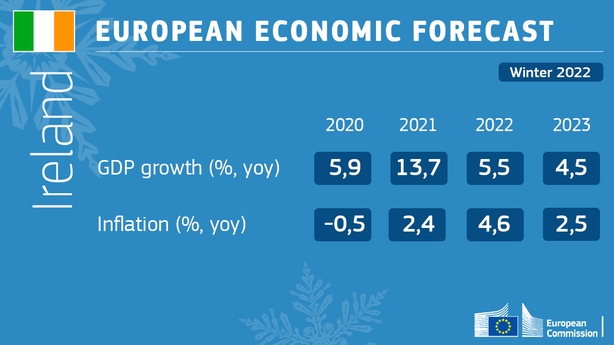The European Commission has upgraded its growth forecast for Ireland, on the strength of the predicted recovery from the impact of the Covid-19 pandemic.
However, it has also increased its forecast for inflation in Ireland this year to 4.6% from the 3.1% prediction it laid out in its last forecast in the autumn.
The Commission now expects the economy as measured by Gross Domestic Product (GDP) to grow by 5.5% this year, up from an expected 5.1% when it published its last forecast in November.
It says the growth will be propelled by a rapidly recovering labour market, a gradual reduction of large household savings through consumption and a relatively benign financial situation in the corporate sector.
The Winter 2022 Economic Forecast also predicts that next year the Irish economy will grow by a further 4.5%, up from a previous estimate of 4.1%.
The additional economic expansion will come off the back of an estimated 13.7% growth in GDP last year, the Commission says.
That's down from the estimate of 14.6% outlined in its last forecast in the autumn.
It says solid exports meant growth in the final quarter of the year was positive.

But the impact of the Covid-19 Omicron variant, which led to the imposition of fresh restrictions, weighed heavily on retail sales and business confidence in the run up to Christmas.
Multinational output was also unpredictable in October and November it said.
Overall, the research predicts that the EU economy as a whole will expand by 4% this year and 2.8% next year.
That compares to growth of 5.3% last year.
We need your consent to load this rte-player contentWe use rte-player to manage extra content that can set cookies on your device and collect data about your activity. Please review their details and accept them to load the content.Manage Preferences
Euro area growth is also expected to reach 4% in 2022, softening back to 2.7% next year.
"Growth continues to be shaped by the pandemic, with many EU countries under pressure from a combination of increased strain on healthcare systems and staff shortages due to illness, precautionary quarantines or care duties," the Commission said.
"Logistic and supply bottlenecks, including shortages of semiconductors and some metal commodities, are also set to keep weighing on production, at least throughout the first half of the year."
"Last but not least, energy prices are now expected to remain elevated for longer than expected in the Autumn Forecast, thereby exerting a more protracted drag on the economy and higher inflationary pressures."
The Commission has considerably revised upwards its inflation forecast for the euro area, predicting that after hitting 4.6% in the fourth quarter of last year it will peak at 4.8% this quarter and stay above 3% until the third quarter.
"As the pressures from supply constraints and high energy prices fade, inflation is expected to decline to 2.1% in the final quarter of the year, before moving below the European Central Bank's 2% target throughout 2023," it said.
The research also claims uncertainty remains due to the ongoing effects of the pandemic and risks remain high.
However, it also says that household demand could grow more strongly than expected as economies reopen.







